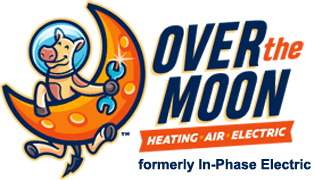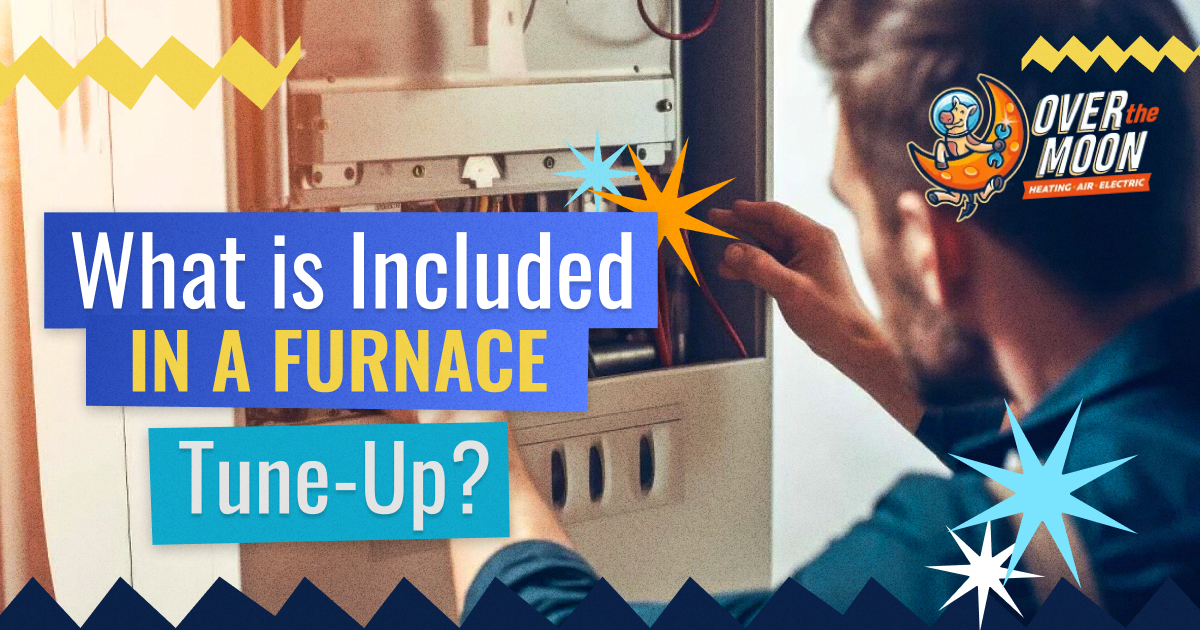A furnace tune-up includes a range of tasks to ensure your heating system is safe, reliable, and efficient. Furnaces have many moving parts. Without proper care, these can wear out or break down. Preventative maintenance can avoid such a situation, ensuring optimal comfort throughout the winter. We’ll now detail what a professional furnace tune up from Over the Moon entails.
Furnace Inspection
Unless you point them to specific issues, a maintenance technician will begin a tune-up with a thorough inspection of your furnace. It includes a visual check of system components and functional evaluations. The start of a tune-up generally begins with a look at the following:
- Furnace Exterior
- Access Door
- Heat Exchanger
- Air Filter
- Duct Connections
- Gas Connections
- Burners
- Wiring Connections
- Start and Run Capacitors
- Blower Fan, Wheel, and Motor
- Fan Belts
- Motor Bearings
- Flue Vent
- Furnace Controls
The heat exchanger is one of the most important parts to check. Issues such as corrosion, cracks, or separation can allow carbon monoxide to escape. A contractor will repair any damage or replace the heat exchanger to restore your safety.
Changing the air filter is part of any furnace tune-up; it maintains proper airflow and keeps the unit running smoothly and efficiently. The technician also checks that the access door is secure, if there’s a gas leak, and for signs of exhaust issues. Air ducts will be checked as well for leaks or gaps to fix so your heating system runs at peak efficiency.
Functional Tests
Various tests may be performed to see how your furnace is operating. One of the first tests is for thermostat calibration. A calibrated thermostat improves comfort and reduces energy consumption. Safety controls, such as the high-temperature limit switch, are tested to ensure the furnace is protected from overheating. The technician will also test the system’s startup cycle, fan speed, voltage and current levels, gas pressure, and carbon monoxide levels.
Depending on the type of furnace, they may also analyze combustion gases, the pilot light, electronic ignition, or thermocouple performance. Oil and gas furnaces require more safety checks to ensure you can operate them without any hazards. The contractor will measure the temperature drop across the coil and airflow through the system with any furnace. They’ll also check the condensation drain and clear it if necessary.
System Cleaning, Adjustments, and Electrical Checks
It’s common for dust, dirt, and debris to collect inside a furnace. During a tune-up, these are carefully cleaned out. Burners, ignitors, flame sensors, and combustion components are vulnerable to soot buildup, which a trained professional can clean so all these parts work properly.
Adjustments are also an important part of a furnace tune-up. The technician will:
- Inspect the air intake grill and clear any blockages.
- Check for and remove flue blockages to prevent toxic fumes.
- Adjust burners to maximize efficiency.
- Inspect belts and tighten any that need additional tension.
- Clean debris out of the condenser unit.
- Lubricate motor bearings and other moving parts.
- Check for and tighten loose wiring connections.
- Examine contactors, relays, fuses, and other electrical components.
Addressing small issues improves safety and performance and prevents costly damage and malfunctions. Heating system failures can be prevented. A tune-up also helps improve efficiency, so the entire process makes operating a furnace more cost-effective.
How Long Does a Tune-Up Take?
A furnace tune-up typically takes a professional about one to two hours. However, the duration of the process can depend on the size of your heating system, its age and condition, the type of furnace or heater, and other factors.
Can I Perform a Furnace Tune-Up Myself?
A tune-up is best left to a professional. However, you can do simple maintenance tasks such as changing the filters regularly, which improves airflow and reduces strain on your furnace. Clearing obstructions from vents and registers improves air circulation and efficiency. Wiping and vacuuming debris around your furnace is also a great way to keep it clean and free of functional issues between tune-ups.
If I Recently Bought My Furnace, Does It Still Need a Tune-Up?
Many people think new furnaces don’t need to be tuned. However, they can benefit even more from preventative maintenance. An annual tune-up from the start can help your new furnace last 15 to 20 years. Not meeting maintenance requirements can result in the system failing sooner than expected.
However, maintaining older furnaces also has benefits. Some people think it’s not worth the cost, but it’s possible to increase a heater’s life expectancy even if it’s been in service for several years.
Schedule Furnace Maintenance with Over the Moon
A furnace tune-up is as important as an oil change for a car. It can prevent sudden breakdowns and safety issues. Routine maintenance can also save you money on repairs, energy bills, or replacing your furnace early. Our technicians are trained, licensed, and equipped to tune your furnace properly and make any small repairs necessary. To schedule a furnace tune-up in and around Waukesha County, call (262) 218-2842 today.

